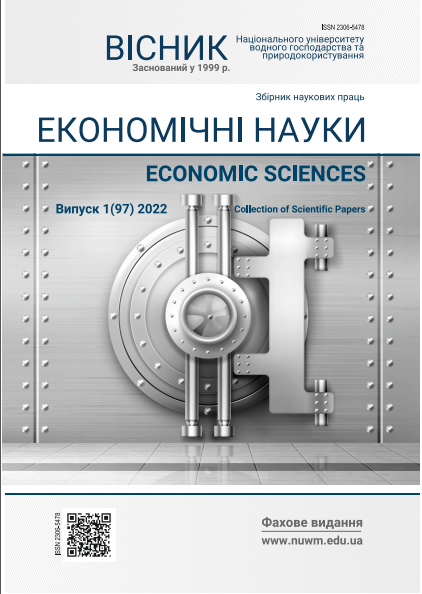FEATURES OF INTELLIGENT CAPITAL MANAGEMENT IN THE FIELD OF LAND RELATIONS
DOI:
https://doi.org/10.31713/ve120221Keywords:
land relations, intellectual capital, intellectual potential, subjects of agro-economy, intellectual resources.Abstract
The article notes that the growing challenges of pandemics, the negative impact of changes in the environment increases the impact of limited traditional resources and raises issues of sustainable development of Ukrainian agricultural enterprises through the spread of digitalization, greening and compliance with corporate social responsibility. The application of the outlined ways of modernization of agricultural production processes involves the spread of the practice of formation and use of intellectual capital in the field of land relations.Research has shown that any existing economic schools from the same position approach the rationale for the postulate that information, knowledge, intellectual resources are becoming one of the main ways to achieve high socio-economic results at both micro and macro levels.Research of intellectual capital in the field of land relations has its own characteristics of the factors that affect its development and management. First of all, it is the seasonality of production, natural and climatic conditions, low level of introduction of modern technologies in agricultural production, not high solvent demand of peasants and so on.Thus, intellectual capital in the field of land relations should be understood as capital, which is formed by intellectual resources of agriculture, as well as natural and economic potential of territories and regions, which in the process of interaction form a new value.The main components of the intellectual capital of an agricultural enterprise include human capital, structural (organizational) and consumer.For most agricultural enterprises, the lack of intellectual resources is an obstacle to the development of innovation. For an entity that invests its time, money and energy in business, intellectual capital is very important. An enterprise that does not use the intellectual knowledge of its staff will not be interested in success and innovation. One of the reasons why entrepreneurs do not use intellectual capital is that they do not see a promising return from the use of mental energy in the form of profits on invested capital.Within the agricultural complex, intellectual products represent the implementation of the results of experiments, research and development in the form of new varieties of agricultural plants, breeds and species of animals and birds, food, materials, livestock and crop technologies, fertilizers and plant and animal protection products, treatments animals and birds, lending and financing of agricultural production, ways of training, retraining and advanced training of labor personnel, forms of organization and management of various sectors of the economy, approaches to improving the efficiency of agricultural production in general.Regarding the peculiarities of management and development of intellectual property in the field of land relations, it should be noted that they are grouped into the following components: economic, regulatory and organizational.The article substantiates the tasks of future development of Ukrainian agrarian business.References
Запухляк В. М. Людський капітал як чинник підвищення конкурентоспроможності аграрного сектору економіки України. Агросвіт. 2017. № 3. С. 40–44.
Коломієць Т. В. Формування аграрної інноваційної системи як шлях до накопичення інтелектуального капіталу підприємств агросектору. Економіка АПК. 2016. № 11. С. 94–99.
Курило Л. І. Формування інтелектуального капіталу в аграрній сфері: теоретичний аспект. Економіка АПК. 2014. № 8. С. 5–12.
Шпак Н. Особливості формування людського капіталу в аграрному секторі інформаційної економіки. Проблеми і перспективи економіки та управління. № 3 (11). 2017. С. 28–38.
Інноваційна діяльність в аграрній сфері: інституціональний аспект: моногр. / [Саблук П. Т., Шпикуляк О. Г., Курило Л. І. та ін.]. К.: ННЦ ІАЕ, 2010. 706 с.
Шпикуляк О. Г. Інтелектуальний та людський капітал як детермінанти інноваційного розвитку економіки: ін¬ституціональний аспект. Інноваційна економіка. 2011. № 3. С. 3–9.
Brooking A. Intellectual Capital:Core Assets for the. Third Millennium Enterprise. United Kingdom, London: Thomson Business Press, 1996.

